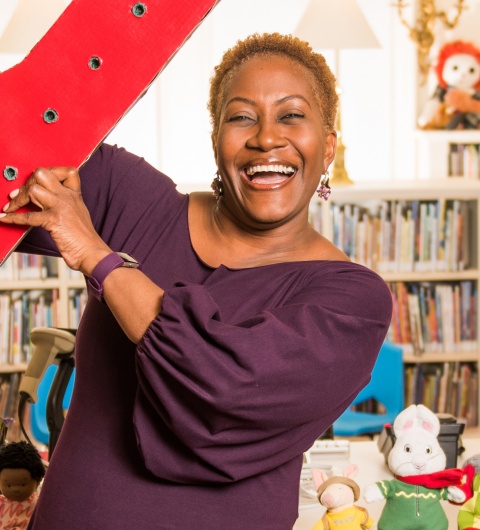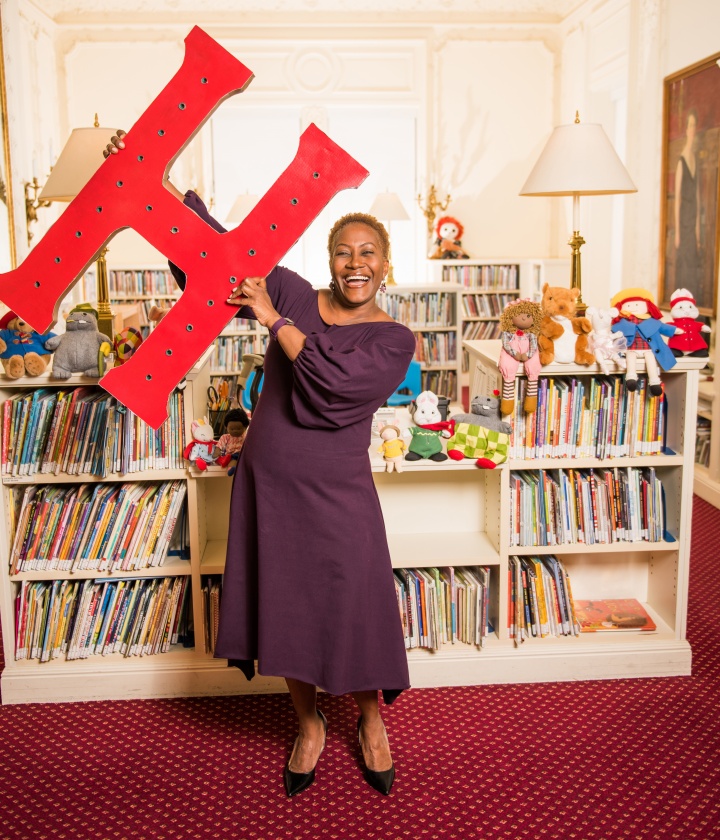Columbia College | Columbia University in the City of New York
Take Five with Wanda M. Holland Greene ’89, TC’91

What were you like when you arrived at Columbia?
“All I know is that we’ve gotta get it
We’ve gotta make it on our own.” — On Our Own (Bobby Brown, 1989)
On the morning of move-in day, I boarded the 2 train at the Beverly Road stop in Brooklyn with most of my belongings and all of my dreams. I was then and am now a loud and proud New Yorker, a huge Knicks fan, a lover of music and poetry and a passionate scholar. As an alumna of The Chapin School, an all-girls independent school in Manhattan, I felt confident, academically prepared and tremendously excited to be a part of the third wave of Columbia College women to arrive on the Morningside Heights campus.
My mother, a registered nurse and by then a nursing home administrator, had taken the day off from work to accompany me to Carman Hall. As the daughter of working-class parents, I knew that her daytime presence was a big deal. (My father, a welder, needed to go to work.) I knew for sure that I had my parents’ love and unfailing support, yet I remember thinking, “Wanda, you’re on your own now.” My mother handed me $1,000 in cash that she had borrowed from her older brother. “This is all I have, and it’s not even mine,” she said to me with tears and prayers in her eyes.
When I arrived at Columbia, I was smart, strong and poor — traits that had made me both resourceful and resilient. I paid for my own education with loans, grants and earned wages.
What do you remember about your first-year living situation?
“The Love Shack is a little old place where
We can get together.” — Love Shack (B-52’s, 1989)
I should take this opportunity to apologize to my amazing 703B Carman Hall roommate, Jody Collens Fidler ’89, who endured my room (glossy pages ripped out of Essence and a gigantic poster of myself staring like the Mona Lisa), my Jheri curl plastic night cap (don’t laugh — it was the ’80s), and my high school boyfriend. I don’t know which of the three was her biggest eyesore. All I can say in defense of my 17-year-old self is that I have always believed that black women are Wakanda-fierce and stunningly beautiful, so Scotch-taping their faces to the white cinder-block wall made perfect sense to me. I did get rid of the Jheri curl and the boyfriend when they both went out of fashion. All told, there was a lot of love and friendship in that little old dorm room. Love you, Jody.
What class do you most remember and why?
“Keep on movin’, don’t stop, no
Keep on movin’.” — Keep On Movin’ (Soul II Soul, 1989)
I am an academic, so it’s surprising that the class I remember most is “Beginner Swimming.” A dear friend drowned at Coney Island when we were young children, and I was petrified of the water thereafter. I put the swim test out of my mind for as long as I could, and then I had no choice but to take swimming in the spring of my senior year. Luckily, the very deep pool at Columbia was being repaired that semester, and all swimming classes were being held in a smaller pool at Teachers College. The TC pool only went from 4 ft. to about 7 ft., but my fear of being underwater did not subside. During each class, I did what I could while my eyes burned from chlorine, tears and humiliation. I felt alone, weak and inadequate, none of which I had ever experienced in school, but I kept moving forward. At the end of the semester, I did not pass the swim test. The kind and patient instructor waived the requirement because of my daily effort. I still can’t swim, but my two awesome sons can.
Did you have a favorite spot on campus, and what did you like about it?
“God is just, just a prayer away
He’s never too busy
To hear every word you say.
Call him up, night or day!
God is just a prayer away.” — Just A Prayer Away (Rev. Milton Brunson & The Thompson Community Singers, 1989)
The basement of St. Paul’s Chapel is my favorite spot on campus because it is where the Barnard/Columbia Gospel Choir rehearsed on Monday nights. I met my best friend, Traci Turner Wilkerson BC ’90, when I joined the choir during my senior year, and she and I co-directed the group for several years even after we graduated. When students from all walks of life lifted their voices in harmony and praise, nothing else mattered. Exams, papers and projects gave way to the divine, and hope, love and joy reigned. I dream about a gospel choir reunion. I bet students and faculty would fill Altschul Auditorium in SIPA for a reunion concert, just like they used to.
What, if anything, about your College experience would you do over?
“My world was shattered, I was torn apart
Like someone took a knife and drove it
Deep in my heart.” — If I Could Turn Back Time (Cher, 1989)

Greene at The Hamlin School in San Francisco

